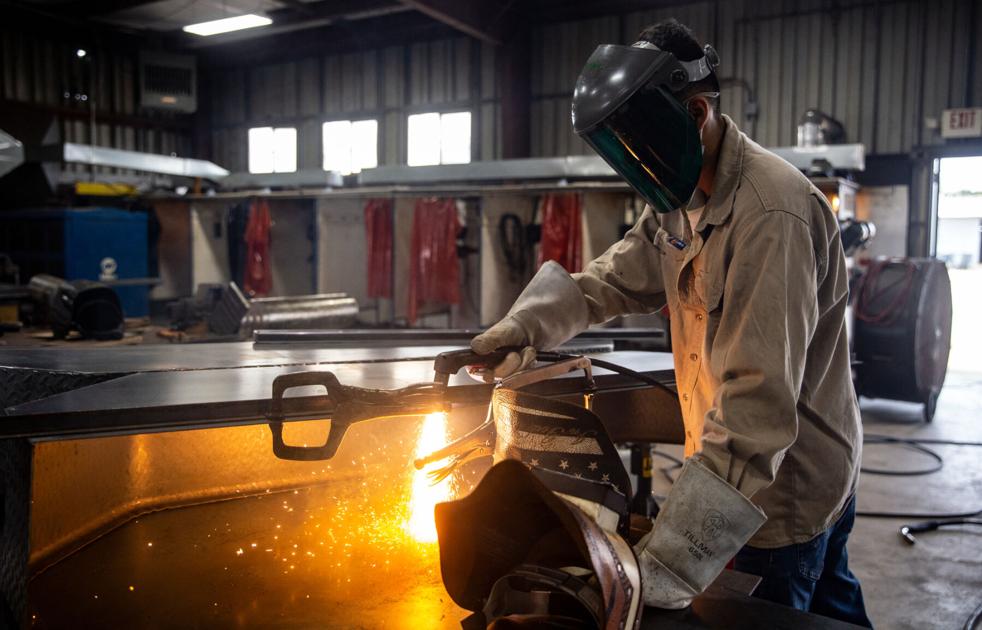Officials say Bloomington ISD bond failed due to narrow scope and ‘imprecise’ voting language | Victoria
[ad_1]
BLOOMINGTON – Fresh out of high school, Jose Perez Jr. was surprised on his first day of business school by the material on display in the welding shop.
The equipment, he said, was decades ahead of what he spent four years using as a student at Bloomington High School. As a result, he realized he had some catching up to do.
“It was a little intimidating,” said Perez, 20, who has been in a two-year program at Texas State Technical College in Fort Bend County for a year. “I knew the basics, but felt like I was a step away from the others in the program. “
Perez found his passion spending countless hours in the aging welding shop behind the high school. Most of a $ 1.1 million bond proposal that voters rejected this month would have gone to improve this store and the decades-old equipment it houses. The superintendent said the proposal ultimately fell through due to a lack of awareness from school officials and the state-mandated language on the ballot which an expert said could have mislead voters.
Superintendent Mark Anglin said he was ultimately responsible for the failure of the bond, which was aimed at improving campus security and business school facilities.
Had the proposal been approved, the funds would have been used to improve safety and security on the district campuses, renovate the high school agriculture and welding workshop, the district agricultural barn, and general maintenance needs. , which include a septic system upgrade for the high school and a central air conditioning unit for the district administration facilities. According to the distribution of the district, nearly half of the funds would have been used for the renovation of the high school’s agricultural and welding workshop.
Anglin said the welding program is one of the school’s most popular programs and trains students who are looking for stable, well-paying employment after graduation. Out of about 220 students enrolled in secondary school, more than 50 students are in the welding program.
“It’s not uncommon for these kids to earn $ 30 or $ 40 – sometimes even $ 50 or more – directly from here,†said Ismael Gonzalez, who runs the program and has over 33 years of local experience in trade. “It’s an honest life that it’s good to make a living out of. Children see this.
Gonzalez said many of the shop’s equipment needs will be covered by the bond. Many tools have been rigged by a jury to work properly, and most of them are outdated, he said.
“It would make a huge difference,” he said.
Although he was not allowed to defend the bond, Anglin spent the weeks leading up to the vote informing voters that the proposal would not have raised taxes for residents. Instead of a tax increase, the district planned to pay off the obligation over three years with interest and sinking funds, of which about $ 1.6 million is available, Anglin said. These funds come from past voter obligations and tax increases and can only be used with voter approval.
The bond proposal would not have resulted in a tax increase. In fact, the district has reduced taxes slightly each year since 2009, according to records from the Victoria County Tax Office.
Former school board member John Ellsworth, who resigned from the board after his wife took a position with the district this year, was on the committee tasked with formulating the bond. He said he had failed to find anyone to oppose the bail. He believes residents fearing a tax hike may have voted against the obligation on election day without knowing that this particular proposal would not have raised taxes.
Ellsworth and Anglin both said the new state-mandated language demanded on all ballots with a bond election actively deterred voters even though the proposal would not have done so.
In 2019, as part of the landmark HB 3 school funding bill, the Texas legislature required all ballots with a bond election to be in the language “THIS IS A PROPERTY TAX INCREASE.”
According to guidelines released by Texas Attorney General Ken Paxton’s office after districts requested exemptions, this language is required even though the bond proposal does not call for a tax increase, like Bloomington’s. .
Will Holleman, deputy director of the Texas Association of School Boards, said it’s less common for districts to put bond proposals that don’t include a tax increase to a vote. However, it happens enough that widely applied language is problematic, he said.
“It can be misleading,†he said. “More so, it can call into question information provided by the district. If the public is not also attentive to the specifics of the link, it could be influenced by this language.
Holleman said he and other school funding advocates were pushing for changes to the language. More precisely, he would like the language to reflect what is requested.
“If it’s a tax increase, then he should say so. If it doesn’t, then he shouldn’t say it is, â€he said. “The language just needs to be more precise. “
Anglin said he plans to submit the same proposal to the school board in May, and the details or goals of the proposal are unlikely to change.
“These are still things we need, and that is not going to change,” he said. “We’ll just do a better job of educating people on this.”
[ad_2]


Comments are closed.